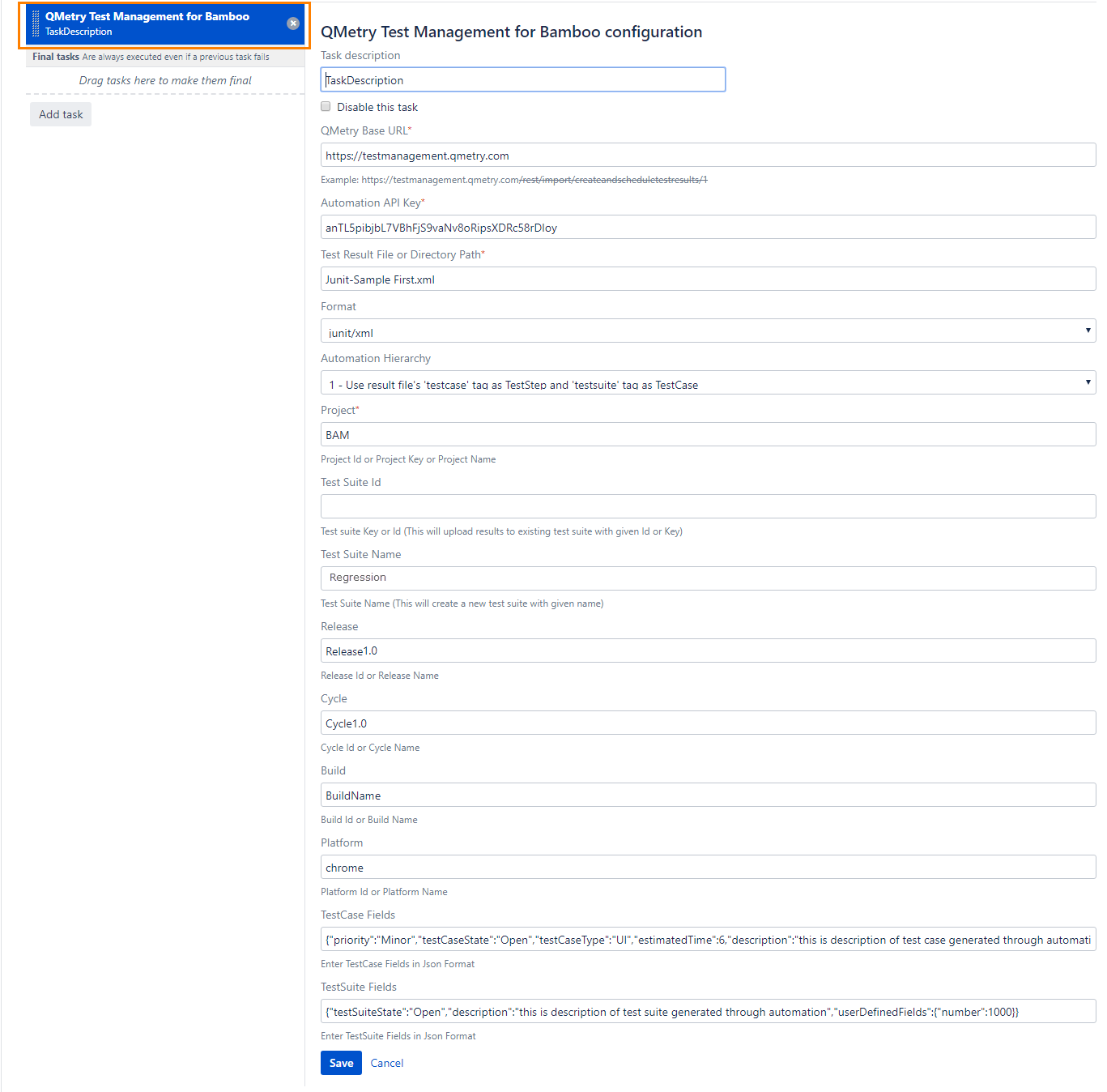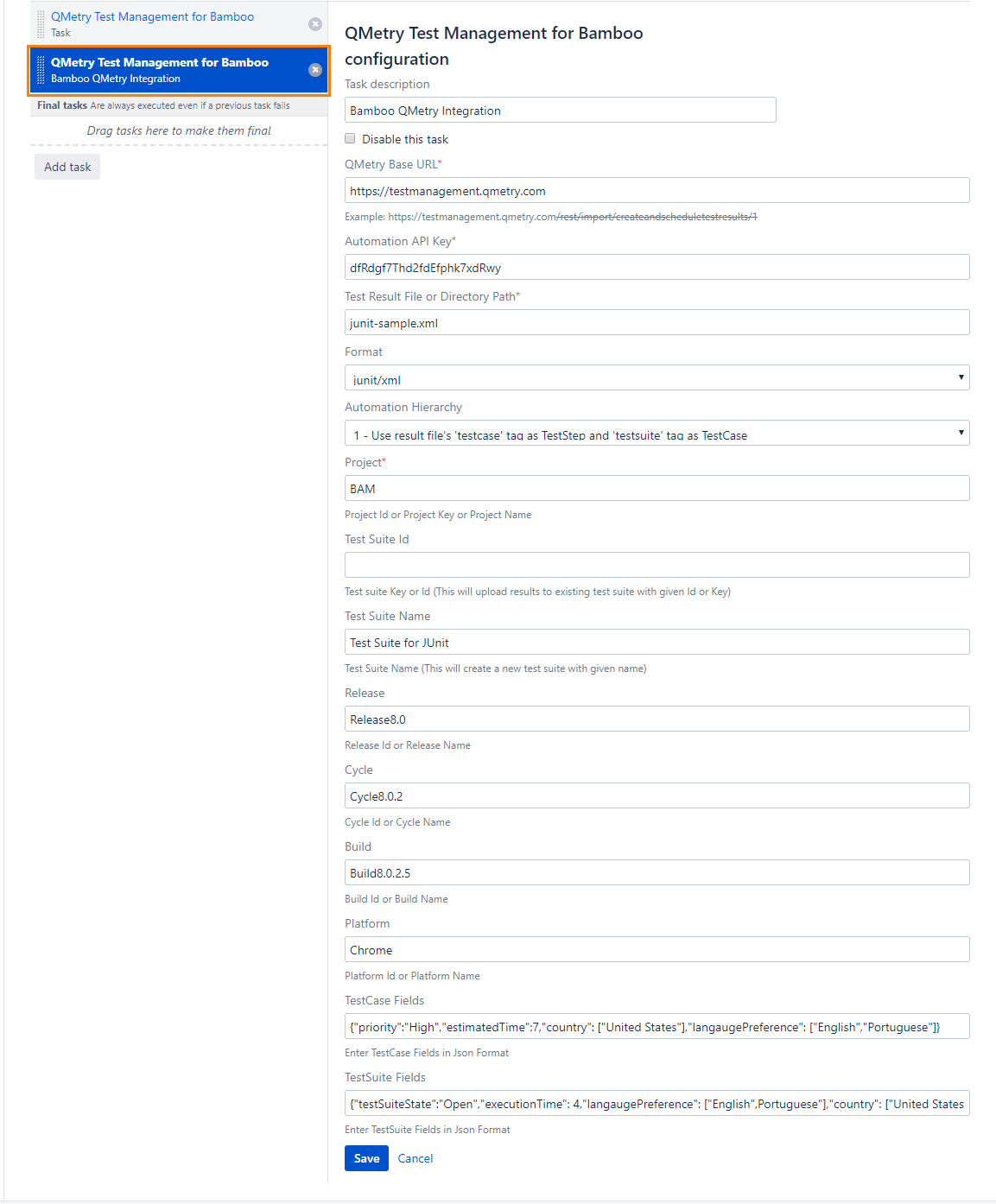QMetry Test Management for Bamboo add-on is designed for QMetry Test Management v8.x. QMetry Test Management for Bamboo is a free add-on.
...
9. Configure the QMetry Test Management for Bamboo task.
Parameters
Parameter | Required | Description |
QMetry Base URL | Yes | QMetry Test Management URL |
Automation API Key | Yes | Your API Key. API Key is unique for a specific user in a single project. The result will be imported for the project associated with the given API Key. Login to QMetry >> Go to Integrations >> Automation API >> Generate |
| Test Result File Path or Directory Path | Yes | Your result file to be uploaded. Example : The Bamboo plugin is expecting the file in BambooHome/xml-data/build-dir/<Project Name> |
Format | Yes | Supported Formats
|
| Automation Hierarchy | No | Hierarchy which will be used to parse test result files on QTM. Supported formats are: JUnit 1 - Use result file's 'testcase' tag as TestStep and 'testsuite' tag as Testcase (default) 2 - Create Single Testsuite and link all Testcases to that Testsuite ('testcase' tag will be treated as Testcase) 3 - Create Multiple Testsuites and then link their respective testcases in corresponding Testsuites ('testcase' tag will be treated as Testcase) TestNG 1 - Use result file's 'class' tag as Testcase and 'test-method' tag as TestStep (default) 2 - Use result files 'test-method' tag as Testcase 3 - Use test 'name' as Testcase and test-method as TestStep |
| Project | Yes | ID/Key/Name of the Project within which the test suite will be created as mentioned in the Test Suite parameter below. |
| Release | *No | ID/Name of the Release in which the test execution will be created. If Release is not mentioned, then Default Release will be considered. |
| Cycle | No | ID/Name of the Cycle in which the test execution will be created. If Cycle is not mentioned, then Default Cycle will be considered. |
| Build | No | ID/Name of the Build that provides reference to the test run which is to be executed. |
| Test Suite | No | Key/ID of the test suite exists in QMetry. In the absence of Key, a new test suite will be created in the following syntax: Automation-<Format>-<Date & Time> e.g. Automation-JUNIT-Mon Mar 12 07:25:22 UTC 2018 Note: If for Junit, Option 3 - Create Multiple Testsuites and then link their respective testcases in corresponding Testsuites - is chosen, then the parameter Test Suite ID will be ignored. |
| Test Suite Name | No | If existing "testsuiteId" is not being used and auto-generated name for the new test suite is not desired, then a custom test suite name can be entered for this parameter. Note: If for Junit, Option 3 - Create Multiple Testsuites and then link their respective testcases in corresponding Testsuites - is chosen, then the parameter Test Suite Name will be ignored. |
| Platform | No | Name/ID of Platform on which test run to be executed. If Platform is not mentioned, then the test run will be executed on the default platform named “No Platform”. |
Test Case Fields (JSON Format) | No | Mention system defined fields and user defined fields for test case as shown in Test Case JSON format below. All the mandatory fields other than Summary should be mentioned in this parameter. |
Test Suite Fields (JSON Format) | No | Mention system defined fields and user defined fields for test case as shown in Test Suite JSON format below. All the mandatory fields other than Summary should be mentioned in this parameter. This parameter will be ignored if existing Test suite Id is used to upload results. |
...

